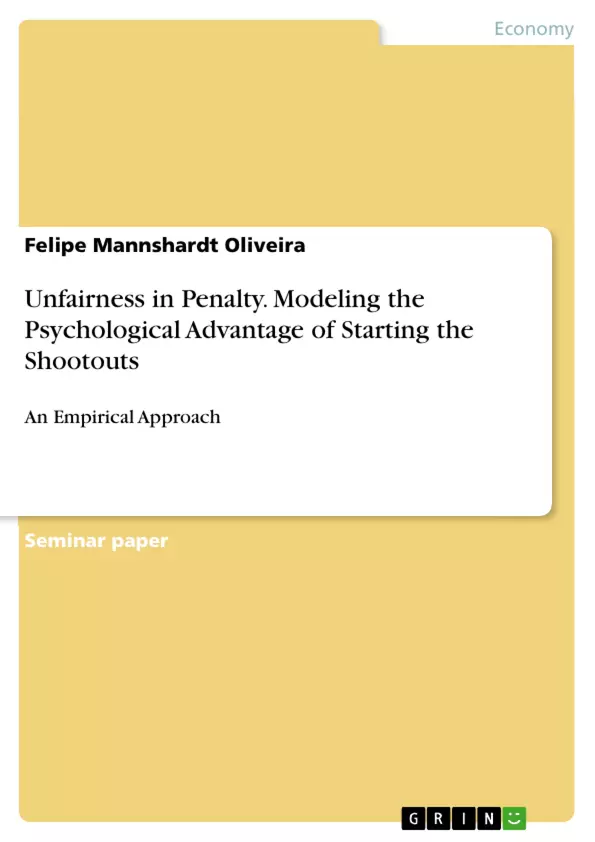Despite it’s name, the field of game theory has had for a long time a somewhat weaker relationship with sports and games in general – although it has always been more advanced than other fields in economics with regards to its closeness to sports and games. In its early days, game theory was mostly occupied with big and more serious topics than sports and games, such as industrial organization in economics, wars and other military issues in political sciences. The reason behind this development in the early days of game theory might be due the fact that this field kind of been developed through turbulent times of World War II and Cold War – for example (e.g.) „prisoner’s dilemma“ within the nuclear arms race between USA and Russia (back then USSR).
Lately though there has been some development in the game theory within other fields, like sports and games, especially football, books like "The economics of football" (2001) and "Soccernomics" (2012) are good starting points into the subject. While these books generally inquire help from economics to explain football’s issues, Apesteguia and Palacios-Huerta (2010) (and Palacios-Huerta (2014)) gives priority to illustrate how football can help economics (the other way around).
Inhaltsverzeichnis (Table of Contents)
- 1. Introduction
- 2. Literature Overview
- 3. Causal Effect, Identification and Randomization
- 3.1. Modeling Causal Effect and Randomization
- 3.2. Conclusion.
- 4. Binomial Regression
- 4.1. Linear Probability Model .
- 4.2. Non-Linear Models
- 4.2.1. Probit
- 4.2.2. Logit
- 4.2.3. Conclusion.
- 5. The Data-sets, Variables and it's Statistics
- 6. Regressions
- 7. Conclusion
Zielsetzung und Themenschwerpunkte (Objectives and Key Themes)
This seminar paper aims to empirically replicate the work of Apesteguia and Palacios-Huerta (2010) using the statistical software R (2015) and the glm R-Package to perform binomial regressions to calculate if a team that starts the penalty shootouts has a higher probability at winning the game at the end, then otherwise. The paper also explores possible further improvements and specifications that could enhance the results found by Apesteguia and Palacios-Huerta (2010).
- The psychological advantage of starting penalty shootouts in football.
- Modeling causal effect and randomization in the context of penalty shootouts.
- The application of binomial regression to analyze the probability of winning a game after a penalty shootout.
- Data analysis and statistical modeling to determine the impact of starting the penalty shootout on game outcomes.
- Exploring potential improvements and specifications for the analysis of penalty shootouts.
Zusammenfassung der Kapitel (Chapter Summaries)
The paper begins with an introduction that provides context and highlights the growing interest in applying game theory to sports, particularly football. It then reviews relevant literature on the unfairness of penalty shootouts, emphasizing the work of Apesteguia and Palacios-Huerta (2010). The paper delves into the theoretical aspects of causal effect, identification, and randomization, providing a foundation for the empirical analysis. It then introduces binomial regression, discussing both linear probability models and non-linear models (Probit and Logit). The paper then describes the data used for the analysis, outlining the variables and relevant statistics. Finally, the paper presents the results of various regression models, comparing them to the findings of Apesteguia and Palacios-Huerta (2010). The conclusion summarizes the findings, suggests potential improvements to the data analysis, and explores possible changes to the penalty shootout system that could promote fairness.
Schlüsselwörter (Keywords)
This paper focuses on the analysis of penalty shootouts in football, employing game theory, binomial regression, and empirical data analysis. Key concepts include causal effect, randomization, unfairness, psychological advantage, Probit and Logit models, and statistical modeling.
Frequently Asked Questions
Is there a psychological advantage for the team starting a penalty shootout?
The paper investigates the theory that the team kicking first has a higher win probability due to the psychological pressure on the team that has to "catch up."
What statistical methods are used to analyze penalty shootouts?
The study uses binomial regressions, specifically Probit and Logit models, to calculate the probability of winning based on who starts the shootout.
How does game theory relate to professional football?
Game theory provides models for strategic decision-making in sports, helping to explain outcomes in high-stakes situations like penalty kicks where randomization and psychological factors play a role.
What were the findings of Apesteguia and Palacios-Huerta (2010)?
Their original research suggested a significant "first-mover advantage" in penalty shootouts, which this paper attempts to replicate and refine using R software.
Can the penalty shootout system be made fairer?
The conclusion of the paper explores potential changes to the shootout format to eliminate psychological biases and promote fairness between the competing teams.
- Quote paper
- Felipe Mannshardt Oliveira (Author), 2016, Unfairness in Penalty. Modeling the Psychological Advantage of Starting the Shootouts, Munich, GRIN Verlag, https://www.grin.com/document/356898



